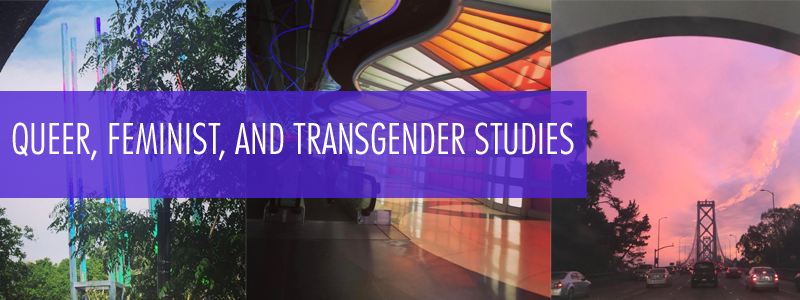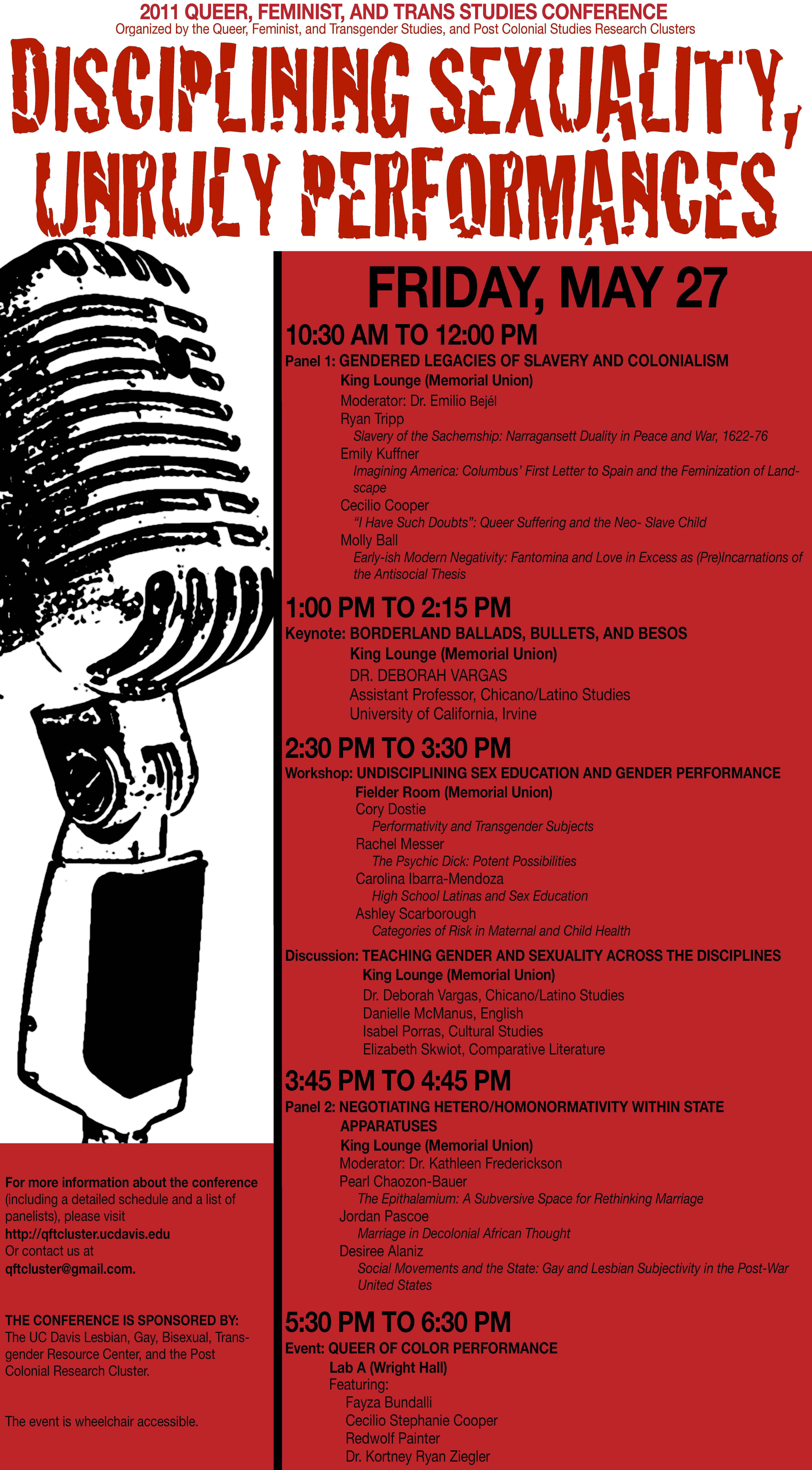Events Archive
The QFT will be co-sponsoring a talk on February 9th with the LGBT Resource Center–
On February 9, 2011, Dean Spade and Eric Stanley will be on campus for an informal lunch-time discussion about prison abolition and their new books Normal Life & Captive Genders
Exact time and location TBA
The Queer, Feminist, and Transgender Research Cluster held a discussion on 11/22/11 in response to the police violence against non-violent protesters on UC Davis campus, to address queer and feminist perspectives on the idea of removing police from campus, and to address the recent hate crimes on campus. About 30 undergraduate and graduate students took part, and the discussion focused primarily on the often confusing process of reporting and responding to both sexual assault and hate crimes on campus, as well as several less-publicized abuses by the UCD Police department. The following is a summary that does not represent the views of everyone participating, but represents the primary concerns that came up. The full version of the notes are attached. Overall, most participants said that drastic change is needed in order to adequately address sexual assault and hate crimes on the UC Davis campus, and that the police force has not been effective in keeping queer and transgender folks, women, and people of color safe. It seems that the current system exists more to protect that university’s reputation rather than to protect vulnerable groups.
1) The Campus Violence Prevention Program came up repeatedly as a possible but problematic alternative to the campus police force. The CVPP combines education with direct response to sexual assault, does not insist upon or require a victim to go to the police, and has some good resources for victims. However, it is also underfunded, only addresses sexual assault and not hate crimes, is a part of the campus police force with funding linked to the police, is not critical or willing to be involved in cases of police violence, treats sexual assault in a heteronormative way as male-on-female rape, and is not widely visible or known to be available by students on campus. The CVPP, in order to be effective, would need to address sexual assault, hate crimes, and police violence, and would need to hire students interns in order to be more visible and better coordinate with different centers on campus.
2) Several people expressed the need for flyers, art pieces, or other forms of widely available publicity explaining the multi-pronged and sometimes contradictory process for addressing sexual assault and hate crimes on campus. This would include information on what happens if a victim goes to the campus police, what happens if a victim goes to the city of Davis police, or to one of the resource centers on campus, and what each of these options offers and precludes. For example, going to the city of Davis police would preclude campus police involvement, but most people don’t know that.
3) Any campus initiatives on security should not reproduce the institutional mechanisms of the police force. They would need to involve both education and victim support and response without othering and criminalizing various groups on campus. They would also need to address the ways that different groups are affected disproportionately by violence on campus. Thus, a new kind of language for security, policing, and community response is needed. Whatever forms of response and education to sexual assault and hate crimes might replace the police—whether they are based in the resource centers, the CVPP, the 24-hour escort service, or a different group—need to be coordinated. Students encountered multiple, contradictory courses of official campus action in response to recent hate crimes. The Campus Council on Community Diversity has a conflict of interest in focusing on diversity statistics, rather than community safety, and is ineffective at coordination of campus response to hate crimes. Having the police report to the Chancellor also creates a conflict of interest, and any alternatives should be community-based.
4) Student Judicial Affairs most often uses the term “biased incident” to ignore hate crimes on campus and therefore limits effective response. However, a campus-based system like SJA might be an effective way to replace everyday security such as traffic or bike tickets.
5) Within the protest movement, minority voices are often ignored. During the rally some people walked away when speakers addressed the issues faced by women, queers, and people of color. People within the movement have also been pressured not to report cases of sexual assault. The protest movement should not be afraid of critique from within, and the workshops in the coming weeks may be a good place to respond to these fractures. Women, queers, transgender folks and people of color need to be involved in shaping this movement through workshops, discussion, and participation.
We’re very excited about our first event for this year, coffee with Professor José Quiroga from Emory University. Rather than a formal presentation or reading group, we hope to spark a productive conversation with Professor Quiroga on queer studies and methodologies. In this light, we’re circulating a copy of the introduction to his book Tropics of Desire: Interventions from Queer Latin America (2001) and his remarks from a roundtable discussion on new directions in multiethnic, racial, and global queer studies, published in GLQ in 2003. Coffee and Conversation with Jose Quiroga November 18th, 2011 Sproul 912 10 AM
José Quiroga is a Professor of Spanish and Latin American Studies. His research interests are contemporary Latin American and Latino literatures and cultures, gender and queer studies, contemporary Cuba and the Caribbean, and Latin American poetry.
His published books include Mapa Callejero (Buenos Aires: Eterna Cadencia, 2010), Law of Desire: A Queer Film Classic (Vancouver: Arsenal Pulp, 2009), Cuban Palimpsests (University of Minnesota Press, 2005) and, in collaboration with Daniel Balderston, Sexualidades en Disputa (Buenos Aires: Ricardo Rojas, 2005). In addition he has also published Tropics of Desire: Interventions from Queer Latino America (New York University Press, 2001) and Understanding Octavio Paz (University of South Carolina Press, 2000).
To obtain the recommended readings please contact efkuffner@ucdavis.edu
“Disciplining Sexuality,
Unruly Performances”
Friday, May 27, 2011
King Lounge
10:30-Noon
Panel 1: Gendered Legacies of Slavery and Colonialism
Moderator: Dr. Emilio Bejél Ryan Tripp Slavery of the Sachemship: Narragansett Duality in Peace and War, 1622-76 Emily Kuffner Imagining America: Columbus’ First Letter to Spain and the Feminization of Landscape Cecilio Cooper “I Have Such Doubts”: Queer Suffering and the Neo- Slave Child” Molly Ball Early-ish Modern Negativity: Fantomina and Love in Excess as (Pre)Incarnations of the Antisocial Thesis
King Lounge
1:00-2:15
Keynote Speaker: Dr. Deborah Vargas, Assistant Professor, Chicano/Latino Studies, University of California, Irvine
“Borderland Ballads, Bullets, and Besos”
This presentation focuses on Chicana singer Chelo Silva, nicknamed “la reina Tejana del bolero (the TexMex queen of the bolero),” who performed during the 1940s to 1960s. Drawing from feminist queer studies, Vargas argues that Silva is a musically dissonant figure who provides alternative “border ballads” that have remained in the echoes of dominant heteromasculinist narratives of Chicano corrido music.
Deborah R. Vargas is an assistant professor in the Department of Chicano/Latino Studies at the University of California, Irvine. Vargas has published in a number of different journals and anthologies including Women and Performance: A Journal of Feminist Theory and Latina/o Sexualities: Probing Powers, Passions, Practices, and Policies and has conducted oral histories with several Chicana singers for the Smithsonian Institution Latino Music Oral History Project. Her monograph Dissonant Divas: Mejicanas, Music, Nation is forthcoming from the University of Minnesota Press in 2012. She is the recipient of a number of fellowships including the Ford Foundation Postdoctoral Fellowship and most recently a University of California Center for New Racial Studies grant to support her current research addressing Mexicana/Tejana racialized sexuality in the social-musical space of the fandango in the Southwest during the 19th century.
Fielder Room
2:30-3:30
Workshop: Undisciplining Sex Education and Gender Performance
Cory Dostie Performativity and Transgender Subjects Rachel Messer The Psychic Dick: Potent Possibilities Carolina Ibarra-Mendoza High School Latinas and Sex Education Ashley Scarborough Categories of Risk in Maternal and Child Health
King Lounge
2:30-3:30
Discussion: Teaching Gender and Sexuality Across the Disciplines
Dr. Deborah Vargas, Chicano/Latino Studies Danielle McManus, English Isabel Porras, Cultural Studies Elizabeth Skwiot, Comparative Literature
King Lounge
3:45-4:45
Panel 2: Negotiating Hetero/Homonormativity Within State Apparatuses
Moderator: Dr. Kathleen Frederickson Pearl Chaozon-Bauer The Epithalamium: A Subversive Space for Rethinking Marriage Jordan Pascoe Marriage in Decolonial African Thought Desiree Alaniz Social Movements and the State: Gay and Lesbian Subjectivity in the Post-War United States
Laboratory A, Wright 101
5:30-6:30
Queer of Color Performance
Fayza Bundalli Cecilio Stephanie Cooper Redwolf Painter Dr. Kortney Ryan Ziegler

